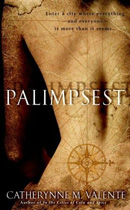

Bantam Spectra, paperback, 9780553385762
Think of a novel as an amalgam of its story, its ideas, its people, and its language. Does a particular story demand a particular sort of language?
Palimpsest is a fantastical city, sprawling over a vast territory, functioning on magic, eclectic in architecture, infested with clockwork insects, populated by humans and chimerae, where sentient, willful trains run through the subways. Someone from our world may visit, but only in his or her dreams, and only after a sexual encounter with someone who has already been there. That partner will have had a skin blemish somewhere on his or her body, an apparent tattoo, which is actually a map of a region of Palimpsest. In his or her next dream, the new initiate will be able to visit that region. He will awaken with a map tattoo on his own skin, indelible, giving access to a different neighborhood of the city to all his subsequent partners. To explore new areas himself, he must find new partners.
We explore Palimpsest with several people, each quite peculiar even before venturing there, as they learn the city and, eventually, seek to emigrate to it permanently. Valente has a fabulously inventive imagination, and it's a joy to see her invent the people, creatures and places of the city. The language she finds, to tell of the wonders and horrors of Palimpsest, is a lush prose which verges at times on prose-poetry, and which indeed appears to be required by story, idea, and characters. Many—most—of the lushest passages work, advancing the story and giving the reader a glimpse of the marvellous:
The difficulty of writing prose like this is that every word and phrase must be nearly perfect, and must accord with the individual reader's sensibilities. For me, that happened often, though not always, and I liked the book a great deal. Also a matter for individual taste are the many sexual encounters which the initiates must have in our everyday world to carry out their explorations. They must select partners—a great many partners—based on the maps those partners carry, whether any compatibility exists or not. Valente's imagined expeditions are erotic as well as cartographic, and not for every reader.
But one of the points of the literature of the fantastic is to remind us that the world often does not adjust itself to
our sensibilities. Catherynne Valente is a rising star of imaginative literature, and well worth a test of your sensibilities.
